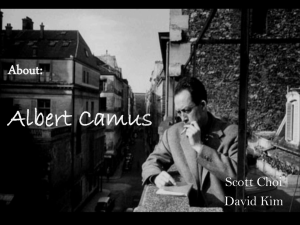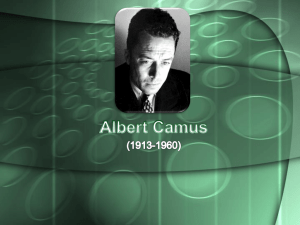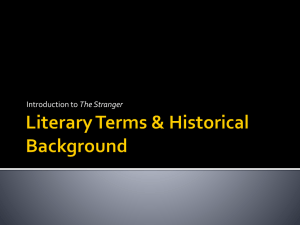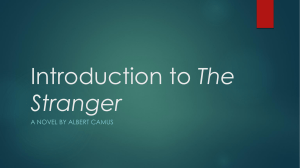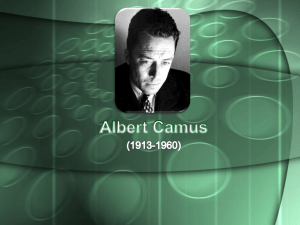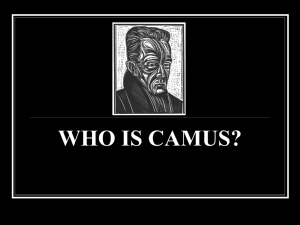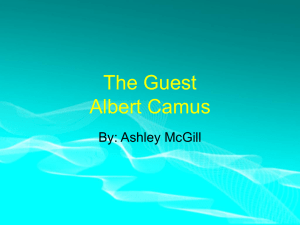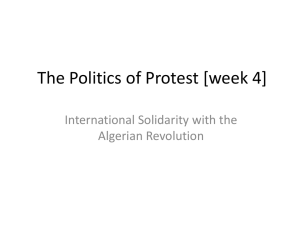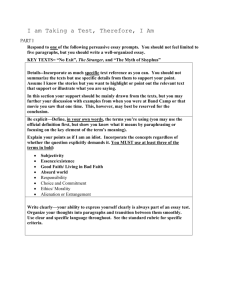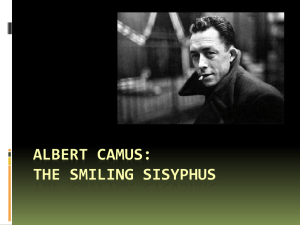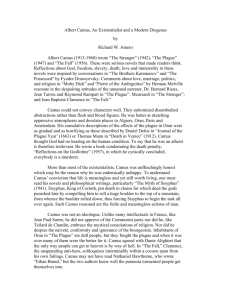Camus
advertisement
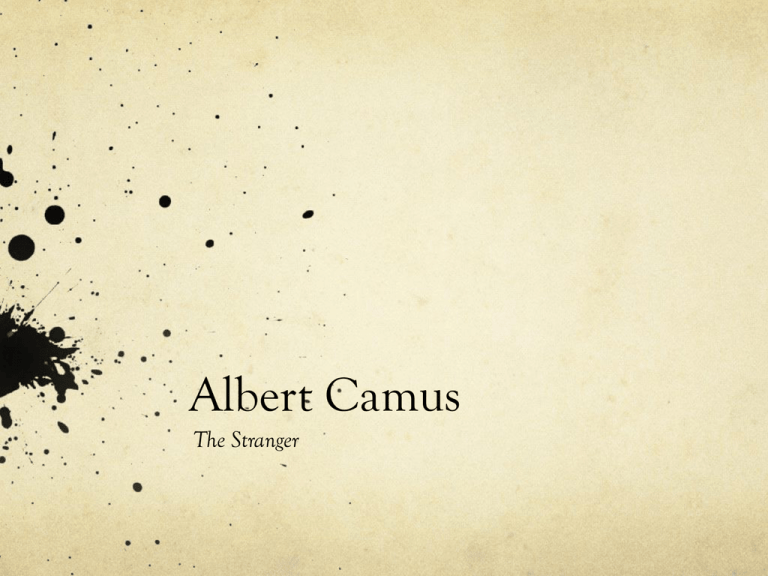
Albert Camus The Stranger What do you think? "This heart within me I can feel, and I judge that it exists. This world I can touch, and I likewise judge that it exists. There ends all my knowledge, and the rest is construction.” What does this mean? Do you agree? Disagree? Does this remind you of anything you’ve read/seen? Camus is not alone… “Life’s but a walking shadow; a poor player/That struts and frets his hour upon the stage/And then is heard no more: it is a tale/Told by an idiot, full of sound and fury/Signifying nothing.”—Macbeth What is Shakespeare asserting here? How is it similar to Camus idea(s) on the last slide? Albert Camus: Background Born: 1913 in Mondovi, Algeria Died: 1960 in France Raised by mother in Algiers (father died) Good student—entered secondary school in 1923, passed lycee exams, accepted into University of Algiers’ School of Philosophy (TB), master’s degree 1936 First trip to Europe 1936 First book (collection of essays) 1937 Setting: Algiers, Algeria (French) Albert Camus: Work/Politics Briefly a member of the Communist Party 1935-39 “Worker’s Theater”—wrote plays of socialist nature for Algerian workers Wrote for an anti-colonialist newspaper in Algeria Attempted to move to Paris to write, German invasion forced return to N. Africa Pacifist, opposed WWII. Returned to Paris during war and worked with “Combat” newspaper/organization (underground intelligence/sabotage) Campaigned against violent revolt (in Algeria) and for human rights Albert Camus: Evolving Philosophy Spent career writing about (and struggling with) absurdist, existentialist, and nihilist ideas After college, developed philosophy, “that no matter how inexplicable existence might be, human life remains sacred”—impacted “absurdist” “existentialist” writing that followed Alienated some other leftist writers by being too humanist— life=meaningless for man, but mankind is more than one person…moderation/nature rather than violence, morality Developed idea of “revolt” as process for understanding/handling “absurdity” of existence. “Camusian revolt consists of three steps: acknowledgement, acceptance, accomplishment.” http://www.egs.edu/library/albert-camus/biography/ http://www.camus-society.com/myth-of-sisyphus.html, Published: 1942 Popular Setting reflects Camus’ background in N. Africa The Stranger Emulates “American” style of Faulkner, Hemingway— short, concise sentences. Minimal, but meticulous, detail. Minimal, terse dialogue. (Not true of all his works.) “A novel is never anything but a philosophy but into images.” Cover Art Other Famous Works: The Plague The Fall A Happy Death Caligula (play) Myth of Sisyphus (essay) Key Themes/Guiding Questions: What is the meaning of life/is there meaning to life? If there is no higher power, what is the point of existence? What is the role of the individual in society? Why must the individual adhere to social norms or constructs—why do they exist, and do they have meaning? Is conformity connected (or the same) as morality? If the individual accepts that he/she will die, how does he/she go about conducting him/herself in society? How does the individual find happiness in understanding his/her reality? How is existence isolating? How/why does acknowledging absurdity isolate the individual? What is a stranger or outsider? How does one become, or create, this status? The individual decides questions of morality and truth. The individual is isolated in a hostile or indifferent universe There is difficulty in attempting to understand human life—it’s a “futile passion.” Existence is unexplainable. The universe is irrational/absurd. The physical world is significant—it trumps emotional or social reactions. “The Myth of Sisyphus” Published 1942, in same realm as The Stranger “I do believe at least that man’s awareness of his destiny has never ceased to advance. We have not overcome our condition, and yet we know it is better. We know that we live in contradiction, but we also know that we must refuse this contradiction and do what is needed to reduce it”—The Almond Trees, 1940 Tackles the “absurdity” of life—if life is meaningless and there is no afterlife, is it worth living? Sources: http://www.egs.edu/library/albert-camus/biography/ http://www.kirjasto.sci.fi/acamus.htm http://www.hampsteadgardenscofc.org.au/190611Algie rs%20map%201.jpg http://www.camus-society.com/myth-of-sisyphus.html http://www.shmoop.com/the-stranger/friendshiptheme.html
